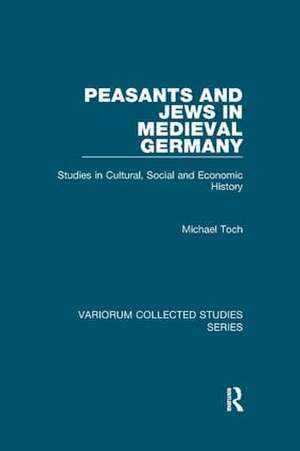Peasants and Jews in Medieval Germany: Studies in Cultural, Social and Economic History: Variorum Collected Studies
Autor Michael Tochen Limba Engleză Paperback – 10 iun 2019
Din seria Variorum Collected Studies
- 9%
 Preț: 938.85 lei
Preț: 938.85 lei -
 Preț: 311.41 lei
Preț: 311.41 lei -
 Preț: 351.48 lei
Preț: 351.48 lei -
 Preț: 313.38 lei
Preț: 313.38 lei -
 Preț: 386.77 lei
Preț: 386.77 lei -
 Preț: 325.68 lei
Preț: 325.68 lei -
 Preț: 396.00 lei
Preț: 396.00 lei -
 Preț: 312.75 lei
Preț: 312.75 lei - 9%
 Preț: 1041.23 lei
Preț: 1041.23 lei -
 Preț: 258.66 lei
Preț: 258.66 lei -
 Preț: 299.55 lei
Preț: 299.55 lei - 9%
 Preț: 938.08 lei
Preț: 938.08 lei -
 Preț: 343.33 lei
Preț: 343.33 lei -
 Preț: 311.18 lei
Preț: 311.18 lei - 9%
 Preț: 937.13 lei
Preț: 937.13 lei -
 Preț: 351.41 lei
Preț: 351.41 lei -
 Preț: 320.00 lei
Preț: 320.00 lei - 34%
 Preț: 764.20 lei
Preț: 764.20 lei - 22%
 Preț: 312.43 lei
Preț: 312.43 lei - 34%
 Preț: 739.65 lei
Preț: 739.65 lei - 34%
 Preț: 764.20 lei
Preț: 764.20 lei - 34%
 Preț: 680.73 lei
Preț: 680.73 lei - 26%
 Preț: 247.40 lei
Preț: 247.40 lei - 34%
 Preț: 485.78 lei
Preț: 485.78 lei - 34%
 Preț: 764.20 lei
Preț: 764.20 lei - 34%
 Preț: 767.07 lei
Preț: 767.07 lei - 34%
 Preț: 764.20 lei
Preț: 764.20 lei - 34%
 Preț: 769.51 lei
Preț: 769.51 lei - 34%
 Preț: 764.20 lei
Preț: 764.20 lei - 34%
 Preț: 826.68 lei
Preț: 826.68 lei - 25%
 Preț: 225.28 lei
Preț: 225.28 lei - 25%
 Preț: 225.54 lei
Preț: 225.54 lei - 34%
 Preț: 736.38 lei
Preț: 736.38 lei - 34%
 Preț: 738.43 lei
Preț: 738.43 lei - 25%
 Preț: 226.52 lei
Preț: 226.52 lei - 33%
 Preț: 491.66 lei
Preț: 491.66 lei - 34%
 Preț: 485.78 lei
Preț: 485.78 lei - 34%
 Preț: 485.78 lei
Preț: 485.78 lei - 36%
 Preț: 739.17 lei
Preț: 739.17 lei - 38%
 Preț: 766.34 lei
Preț: 766.34 lei - 31%
 Preț: 473.94 lei
Preț: 473.94 lei - 18%
 Preț: 843.61 lei
Preț: 843.61 lei - 38%
 Preț: 774.91 lei
Preț: 774.91 lei - 34%
 Preț: 764.20 lei
Preț: 764.20 lei - 34%
 Preț: 764.20 lei
Preț: 764.20 lei - 51%
 Preț: 485.78 lei
Preț: 485.78 lei - 34%
 Preț: 485.78 lei
Preț: 485.78 lei - 34%
 Preț: 769.10 lei
Preț: 769.10 lei - 38%
 Preț: 766.99 lei
Preț: 766.99 lei - 18%
 Preț: 1019.01 lei
Preț: 1019.01 lei
Preț: 303.31 lei
Preț vechi: 351.08 lei
-14% Nou
Puncte Express: 455
Preț estimativ în valută:
58.04€ • 60.48$ • 48.06£
58.04€ • 60.48$ • 48.06£
Carte tipărită la comandă
Livrare economică 03-17 aprilie
Preluare comenzi: 021 569.72.76
Specificații
ISBN-13: 9781138375451
ISBN-10: 1138375454
Pagini: 344
Dimensiuni: 156 x 234 mm
Greutate: 0.64 kg
Ediția:1
Editura: Taylor & Francis
Colecția Routledge
Seria Variorum Collected Studies
Locul publicării:Oxford, United Kingdom
ISBN-10: 1138375454
Pagini: 344
Dimensiuni: 156 x 234 mm
Greutate: 0.64 kg
Ediția:1
Editura: Taylor & Francis
Colecția Routledge
Seria Variorum Collected Studies
Locul publicării:Oxford, United Kingdom
Cuprins
Contents: Preface; The social history of peasant speech: Asking the way and telling the law: speech in medieval Germany; Schimpfwörter im Dorf des Spätmittelalters; Ethics, emotions and self-interest: rural Bavaria in the later Middle Ages; Making do with little: studies in the economic history of the German peasantry: Agricultural progress and agricultural technology in medieval Germany: an alternative model; Lords and peasants: a reappraisal of medieval economic relationships; Peasants of the mountains, peasants of the valleys and medieval state building: the case of the Alps; Hauling away in late medieval Bavaria: the economics of inland transport in an agrarian market; Local credit in an agrarian economy: the case of Bavaria (14th and 15th centuries); Immigration, migration, community and expulsion: studies in the social history of German Jews: The formation of a diaspora: the settlement of Jews in the medieval German Reich; Jewish migrations to, within and from medieval Germany; Siedlungsstruktur der Juden Mitteleuropas im Wandel vom Mittelalter zur Neuzeit; Die soziale und demographische Struktur der jüdischen Gemeinde Nürnbergs im Jahre 1489; Umb gemeyns nutz und nottdurfft willen. Obrigkeitliches und jurisdiktionelles Denken bei der Austreibung der Nürnberger Juden 1498/99; Aspects of stratification of early modern German Jewry: population history and village Jews; Making a living: studies in the economic history of European Jews: Jews and commerce: modern fancies and medieval realities; Jüdische Geldleihe im Mittelalter; Geldleiher und sonst nichts? Zur wirtschaftlichen Tätigkeit der Juden im deutschen Sprachraum des Spätmittelalters; Der jüdische Geldhandel in der Wirtschaft des deutschen Spätmittelalters: Nürnberg 1350-1499; Die jüdische Frau im Erwerbsleben des Spätmittelalters; Der Mankus - eine spätmittelalterliche Auferstehung; Between impotence and power - the Jews in the economy and polity of medieval Europe; Index.
Notă biografică
Michael Toch is the Conrad M. Black Professor in Ancient and Medieval History at The Hebrew University, Jerusalem, Israel
Descriere
The studies collected here centre on the social and economic life of medieval Germany, within a broader European context. The first three articles engage the day-to-day workings of rural society: literature, verbal attack and the language of mediated settlement of conflicts lead to a nuanced view of social hierarchy, in which the meek too have a say. The next group examines some major elements of rural life, dealing with technology, resources, ecology, transport, communication and credit. In the second part, the author focuses on the life of the Jews in Germany, charting the process of settlement, the dynamics of social stratification and household composition, and the impact of economics and persecution on settlement patterns. A case study uncovers the motives and steps that led up to the expulsion of the Jews of Nuremberg in 1498. These themes are followed into the early modern period, when German Jewry mostly came to live a village life. The last studies deal with the economic history of medieval European Jews, including professions other than moneylending, and with the function of women in economic life.
